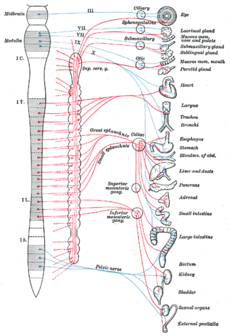Autonomic nervous system

Blue = parasympathetic
Red = sympathetic
The autonomic nervous system (ANS) controls the conditions inside the body. It is sometimes called the 'visceral nervous system' or 'involuntary nervous system'. The ANS is part of the peripheral nervous system.
ANS controls all automatic actions. That means that it controls all reflexes and actions during sleep.
Most of its activities are done without the person having conscious control over them. The person usually cannot feel what the ANS is doing. However, some of the ANS's activities work together with the conscious mind, like breathing.
The ANS controls many different things, like heart rate, digestion, respiration rate, salivation, perspiration, diameter of the pupils, the discharge of urine, and erection.
There are two different sections within the ANS:
- The sympathetic nervous system, which causes the body to become more active as in the "fight or flight" response. The sympathetic nervous system uses a lot of energy.
- The parasympathetic nervous system, which is mostly involved in "rest and digest". It usually conserves energy.
Other websites
[change | change source]- Overview at arizona.edu Archived 2008-06-11 at the Wayback Machine
- ANS Medical Notes on rahulgladwin.com Archived 2007-12-28 at the Wayback Machine
- Explanations on the ANS by Dyansys, Inc. Archived 2013-08-31 at the Wayback Machine
Further reading
[change | change source]- Michael D. Gershon 1998. The second brain. HarperCollins, New York.
